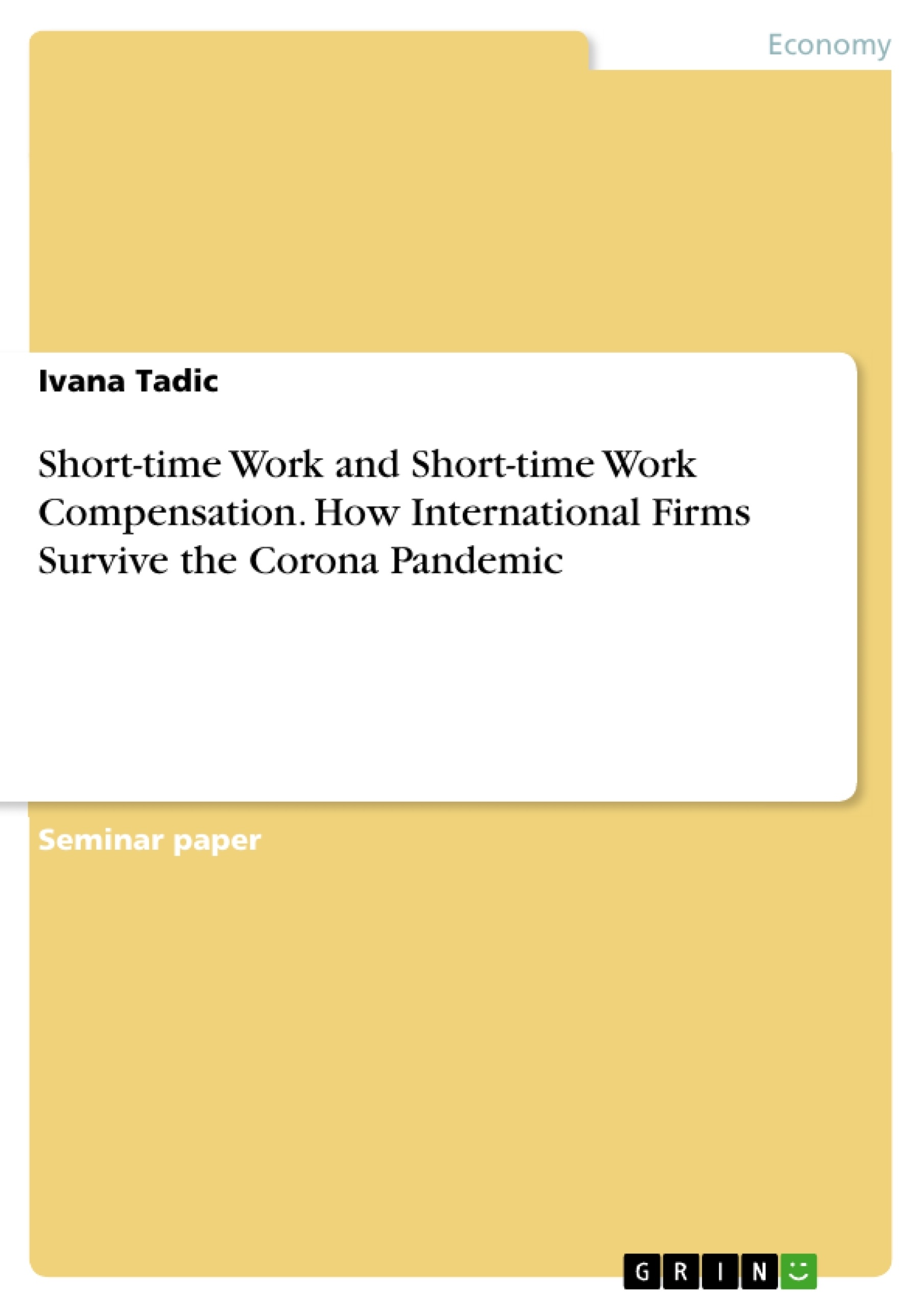This paper will explain what short-time work is, whom it applies to and what requirements a company must meet. The focus of this paper will be on the use of short-time work as a way of saving companies against the background of the current corona pandemic. In this context, it is particularly important to find out what additional measures have been taken to help companies during this period and, in particular, how short-time work can be used to build a bridge for companies to survive this pandemic in the sea of economic consequences.
In April, as a result of the corona pandemic, unemployment figures increased by 308,000 in Germany alone to a total of 2.65 million. Unemployment is expected to climb to more than 3 million. The economy is virtually at a standstill, orders are stagnant, the population is at home and money is no longer flowing. Cancellations of trade fairs and large-scale events, and the decline in travel, are affecting the service sector, especially in the areas of logistics, trade, gastronomy, and tourism. At the same time, foreign demand is dropping, and international supply chains are being disrupted, which impacts production in Germany.
The corona pandemic is hitting companies hard and help is undoubtedly needed if jobs are to be maintained. One form of such help is short-time working. More than half of all German companies have announced short-time work. Introducing short-time work is known to safe companies and maintain jobs through difficult times like these. According to Anke Hassel, a professor of public policy at the Hertie School in Berlin, the policy is one of the reasons why Germany recovered so quickly after the 2008-9 financial crisis.
Inhaltsverzeichnis (Table of Contents)
- 1. Introduction
- 2. Fundamentals of the pandemic and of short-time work
- 2.1. Coronavirus spread and impact on the economy
- 2.2. Short-time work
- 3. How international firms survive the corona pandemic through short
time work and short-time work compensation
- 3.1. Reasons for introducing short-time work during the corona crisis
- 3.2 Why new legal regulations are needed to increase short-time work compensation
- 3.3 New legal regulations
- 4. Conclusion
Zielsetzung und Themenschwerpunkte (Objectives and Key Themes)
This seminar paper aims to analyze the role of short-time work in helping companies survive the COVID-19 pandemic, with a particular focus on the German context. The paper explores the reasons for introducing short-time work during the crisis, examines the need for new legal regulations to increase short-time work compensation, and discusses the effectiveness of these measures in safeguarding jobs and supporting businesses.
- Impact of the COVID-19 pandemic on the global economy
- Role of short-time work as a job protection mechanism
- Analysis of existing legal regulations and their adequacy in supporting short-time work
- Evaluation of the effectiveness of short-time work in the context of the pandemic
- The need for new legal regulations to improve the short-time work system
Zusammenfassung der Kapitel (Chapter Summaries)
- Chapter 1: Introduction This chapter introduces the topic of short-time work in the context of the COVID-19 pandemic, highlighting the severe impact of the pandemic on the German economy and the need for job protection measures. It outlines the importance of short-time work as a tool for mitigating unemployment during economic crises.
- Chapter 2: Fundamentals of the pandemic and of short-time work This chapter provides a detailed overview of the COVID-19 pandemic, discussing its spread, impact on the economy, and the importance of containment measures. It also delves into the concept of short-time work, explaining its definition, principles, and history in the German context, emphasizing its effectiveness in preserving jobs during economic downturns.
- Chapter 3: How international firms survive the corona pandemic through short-time work and short-time work compensation This chapter explores the reasons for introducing short-time work during the COVID-19 crisis, analyzing the specific challenges faced by international firms. It examines the limitations of existing short-time work compensation schemes and argues for the need for new legal regulations to enhance support for companies during the crisis.
Schlüsselwörter (Keywords)
The main keywords and focus topics of this seminar paper are: short-time work, COVID-19 pandemic, economic crisis, job protection, legal regulations, short-time work compensation, international firms, Germany, unemployment, economic impact, containment measures, support measures, labor market.
Frequently Asked Questions
What is short-time work (Kurzarbeit)?
Short-time work is a government-supported program that allows companies to reduce employees' working hours instead of laying them off, with the state compensating a portion of the lost wages.
Why was short-time work crucial during the COVID-19 pandemic?
It served as a bridge for companies to survive economic standstills, stagnant orders, and supply chain disruptions while safeguarding millions of jobs.
How did the pandemic impact the German labor market in early 2020?
Unemployment figures in Germany increased significantly, and more than half of all German companies announced short-time work to mitigate the crisis.
What sectors were most affected by the corona economic crisis?
The service sector, including logistics, trade, gastronomy, and tourism, was hit hard, as were international production companies due to disrupted supply chains.
Were new legal regulations introduced for short-time work in Germany?
Yes, new regulations were implemented to increase compensation levels and make the scheme more accessible to firms struggling with the pandemic's effects.
How effective is short-time work compared to historical crises?
Short-time work is cited as a key reason why Germany recovered quickly after the 2008-2009 financial crisis, proving its effectiveness as a job preservation tool.
- Arbeit zitieren
- Ivana Tadic (Autor:in), 2020, Short-time Work and Short-time Work Compensation. How International Firms Survive the Corona Pandemic, München, GRIN Verlag, https://www.grin.com/document/958689



